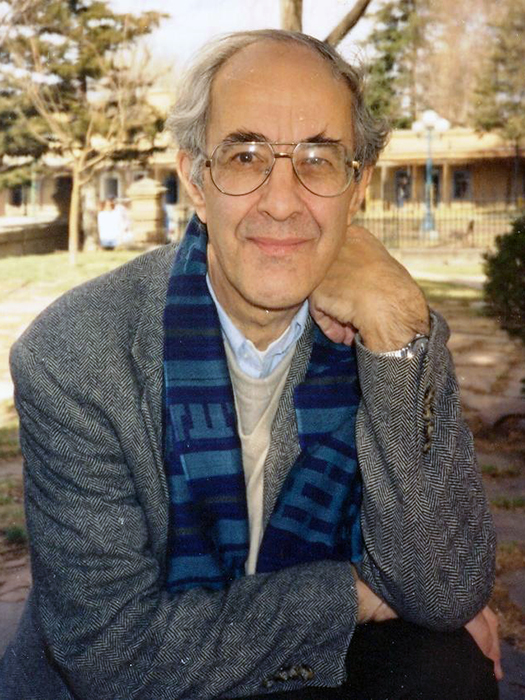不在のミニストリー
[toggle]Absence[/toggle]冒頭の話を読んで、「なんと冷淡な」と思われるかもしれない。しかしこれは、私が牧師になって間もなく知るに至った牧会者の務めに関わる非常に重要なことを意図的に実践したにすぎない。ヘンリ・ナウエンが最初に造った用語を借りれば、取り乱した母親のところに意図的に行かなかったのは「不在のミニストリー」のためだ。
[toggle]While the story from my opening illustration may appear callous or unsympathetic, it was an example of intentionally practicing a vital aspect of ministry which I discovered in the early years of my calling into the pastorate. Borrowing a phrase first coined by Henri Nouwen, my intentional lack of availability to this distraught mother was “the ministry of absence.” [/toggle]
ヘンリ・ナウエン(写真:Frank Hamilton)
この考え方はナウエンのさまざまな著作に散見されるが、特に「生きた想起者」(『傷ついた癒し人』所収、日本キリスト教団出版局)でこの主題に真っ向から向き合っている。この著作でナウエンは、「牧会者は人の求めに応じすぎるきらいがある。つまり、いることが多すぎ、いないことが少なすぎる。その結果、自分が場所を取りすぎて、神と聖霊の居場所がなくなってしまうのだ」と書いている。
[toggle]Though we catch glimpses of this practice throughout many of Nouwen’s writings, his book The Living Reminder contains his fullest treatment of the subject. In it he writes, “We minsters may have become so available that there is too much presence and too little absence … too much of us and too little of God and his Spirit.”[/toggle]「不在のミニストリー」とは、牧会者の仲介なく、一人一人に神が直接働かれる場を創出するための働きのことだ。ナウエンによれば、信徒は本能的に牧会者に来てほしいと求めるが、この背景に隠れているのは、「信徒が神と独りになることを恐れている」という事実だ。牧会者が物理的にその場にいれば、信徒は寂しくない。しかし、〔独りでいなければ〕神がそっと触れてくださる手に気づくことができず、かすかに呼びかけてくださる声も聞こえなくなってしまう。
[toggle]In its simplest form, the ministry of absence is the ministerial practice of creating physical space for God to minister to individuals directly, without the aid of pastoral mediators. According to Nouwen, the instinctive urge for parishioners to call us to their side can often obscure the reality that they are uncomfortable being alone with God. Our physical presence provides a comfortable alternative to interactions with the Divine whose touch and voice are far less tangible. [/toggle]ナウエンは牧会者たちに、「牧会者が意図的にその場にいないようにすることで、信徒が神との直接の関係を養うことを励ます」よう促す。神は、その被造物である人間とはまったく違う作法で人に語りかけられるからだ。ナウエンは書く。「不在のミニストリーに必要なのは、いなくなる技術、はっきりと不在になる能力だ。何よりも大切なのは、創造的に身を引くことである」
[toggle]As such Nouwen urges pastors to practice times of intentional absence whereby people are encouraged to cultivate their relationship with a God who speaks in ways quite different from his human creations. The ministry of absence, Nouwen writes, “calls for the art of leaving, for the ability to be articulately absent, and most of all for a creative withdrawal.”[/toggle]ある晩遅く、私の教会のリーダーの一人が自殺を図ったことがあった。友人や家族は急いで病院に向かったが、私は行かなかった。次の日の午後、私はその人を見舞って話をした。精神病棟で独り長い一夜を過ごしたことで、友人は神の臨在の中に静まり、イエスのほか誰も答えることのできない問いを尋ねることができたそうだ。
[toggle]I remember being contacted late one night with the news that one of my ministry leaders had attempted suicide. Friends and family members were heading to the hospital, but I declined. The next afternoon, I sat in a padded cell with my friend and talked with him about the bandages wrapped around his wrists and forearms. A long night in the solitude of the psychiatric ward had given him opportunities to sit in the presence of God alone to ask questions that only Jesus could answer for him.[/toggle]「夫を酒場から連れ戻してほしい」と泣きながら訴える夫人から電話を受けたこともあった。夫は浮気しており、「愛人のところに行く」と言って出かけたという。私は人事不省になったその夫を見つけだし、わが家の居間に寝かせて酔いがさめるのを待った。翌日、夫を家に連れて行くと、夫人は取り乱してはいたものの、思いのほか落ち着いていた。夫人は独り泣きながら一晩中祈り、神に心を注ぎ出したという。おかげで、朝の光の中、再び立ち上がり、断固とした、しかし愛にあふれた最後通牒(つうちょう)を夫に突きつける力を得ることができた。
[toggle]On another occasion a sobbing wife called and asked me to pick her husband up at the bar. He had recently begun an extramarital affair and left the house with a threat to visit his mistress. I found him in a stupor and let him sleep it off in my living room. When I returned with him to his house the next day, his wife was visibly distraught yet more composed than I had expected. Through a night of tearful prayers, she had poured her heart out to God in solitude and emerged in the morning light with the ability to articulate a firm-yet-loving ultimatum to her husband.[/toggle]いずれの場合も、もし私がすぐに行っていたとしたら、私の慰めや同情は一時的な気晴らしにしかならなかったことだろう。けれども、私の薄っぺらなその場しのぎのアドバイスなど、二人には必要ではなかった。神の臨在の中、暗闇に光をもたらすことのできる唯一の方から直接語りかけていただくことこそ必要だったのだ。
[toggle]In both situations, if I had been immediately present, the comfort of my sympathy and compassion would have only served as a temporary distraction. My friends didn’t need me and my feeble attempts to counsel them or offer impromptu advice, they needed to be in the presence of God to hear directly from the only one able to bring light into their darkness. [/toggle]ナウエンが呼びかけるのは、牧会者がこのように意図的に身を引き、絶えず神に依り頼む弟子としてキリストの体を訓練することだ。ナウエンは言う。「牧会者が生きているイエス・キリストであるというのならば、その場にいることだけでなく、いないことを通しても、主を思い出させることができなければならない」
[toggle]In this way, Nouwen calls pastors to purposeful moments of withdrawal which serve to disciple the body of Christ by constantly forcing members to increase their dependence on God. According to Nouwen, “If it is true that ministers are living memories of Jesus Christ, then they must search for ways in which not only their presence but also their absence reminds people of their Lord.”[/toggle]第二次大戦中に反ナチ運動に参加したドイツ人牧師で神学者のディートリヒ・ボンヘッファーもナウエンと同じことを考えていた。「神の前で、神と共に、神なしで生きる」というボンヘッファーの言葉はしばしば誤解され、間違って使われることが多い。
[toggle]Dietrich Bonhoeffer, the German pastor and theologian who participated in the Nazi resistance during WWII, shared Nouwen’s conviction when he wrote, “Before God and with God we live without God.” While frequently misunderstood and misapplied, [/toggle]ボンヘッファーがここで指摘している事実は、この世で私たちが生きて経験していることなど、実体のない影にすぎないということだ。神はこの世に確かに存在しておられるが、それはやがて来る世で私たちが経験することになる主の完全な臨在とは似ても似つかないものだ。私たちは罪によって損なわれ、「鏡におぼろに映ったもの」(1コリント13:12)しか見ることのできない不完全な被造物として「神の前で、神と共に」生きているのだ。
[toggle]Bonhoeffer’s challenging observation points to the reality that our lived experience on this side of heaven is an existence among shadows. God is certainly present, but in a way very much unlike the totality of presence we will experience in the world to come. We live “before God and with God” as imperfect creations, marred by sin and limited by our ability to see only “in a mirror dimly” (1 Cor. 13:12).[/toggle]ナウエンは、「この事実を私たちは毎週の礼拝で繰り返し確認している」と語る。御言葉と聖餐を通して、私たちは神の存在と不在を同時に思い出す。私たちは主の啓示を学び、主の永遠に響く声が私たちの人生に語りかけてくるのを聞く。それでもなお、顔と顔を合わせて主を見、「はっきり知られているようにはっきり知ることになる」(同)ようになるまで、一部のみを不完全に知ることができるだけなのだ。
[toggle]According to Nouwen, that is a reality rehearsed regularly in our weekly worship. Through the ministry of the Word and sacraments, we are simultaneously reminded of God’s presence as well as his absence. We study his revelation and allow his eternal voice to speak into our current lives, yet we grasp it imperfectly until we are able to see him face to face and “know even as we are known.” [/toggle]私たちは、キリストの霊がここにおられることを信じており、いつの日か主が戻ってこられるという約束も信じている。主の物理的な臨在がなくとも、私たちは生涯、主を礼拝し、主に仕える。主は霊的にずっといてくださるが、いつの日か再び〔物理的にも〕主と一体になることができるという未来の希望のゆえに、私たちは主に従う。主の臨在は、私たちが栄光を受けるまで絶えることがない。しかし、「神の存在のみを証しし、その不在から目を背(そむ)けるのならば、牧会者はその責を果たしているとは言えない」とナウエンは言う。(次ページに続く)
[toggle]We consume bread and wine with the conviction that Christ is spiritually present even as we acknowledge the explicit promise that we will do so “until the Lord returns.” Our entire lives of worship and ministry are practiced without the physical presence of our Lord. While spiritually present at all times, the impetus for our following lies in a future hope of our reunion. We anticipate the kind of unending presence of God that alludes us until we are glorified. Towards this end, Nouwen suggests, “Ministers do not fulfill their whole task when they witness only to God’s presence and do not tolerate the experience of his absence.”[/toggle]